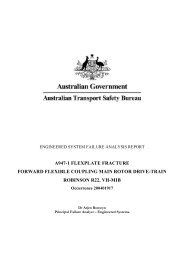In-flight upset - 154 km west of Learmonth, WA, 7 October 2008,
In-flight upset - 154 km west of Learmonth, WA, 7 October 2008,
In-flight upset - 154 km west of Learmonth, WA, 7 October 2008,
- No tags were found...
You also want an ePaper? Increase the reach of your titles
YUMPU automatically turns print PDFs into web optimized ePapers that Google loves.
portions <strong>of</strong> memory are constantly being written, read, and rewritten. As a result <strong>of</strong>this complexity, it can be difficult to predict or trace the effect <strong>of</strong> an SEE.Often, an affected transistor is part <strong>of</strong> a memory device and the SEE changes thedata stored at one particular location in memory. The consequence <strong>of</strong> such amemory change depends on the type <strong>of</strong> data stored in that memory location, thepoint during the s<strong>of</strong>tware program sequence at which the event occurs, and thevalue that the memory takes on as a result <strong>of</strong> the event.Many SEE events result in a near-complete loss <strong>of</strong> system functionality (a ‘crash’ or‘hang’) since the devices in a CPU are critical to nearly every function <strong>of</strong> thesystem. The effects <strong>of</strong> SEE on memory devices are usually more limited in scope.There have been SEEs on other systems where units provided ongoing data outputerrors without a complete loss <strong>of</strong> functionality. These were primarily associatedwith issues with a CPU’s program counter (a segment <strong>of</strong> memory that points to thenext instruction to be executed).The potential for, and impact <strong>of</strong> SEE is very dependent on the architecture,components, and s<strong>of</strong>tware <strong>of</strong> each specific device or system. A particle could affectany one (or more) <strong>of</strong> billions <strong>of</strong> transistors and at any particular moment in time in asystem that changes its state millions <strong>of</strong> times a second, so it can be very hard topredict the outcome. For example, the downstream effect <strong>of</strong> an SEE on a memorycell is highly dependent on the purpose <strong>of</strong> the memory cell and whether it is readand used prior to it being overwritten.Effects on spacecraft and aircraftThe risk <strong>of</strong> SEE is a primary concern for designers <strong>of</strong> spacecraft, partly due to thevery high levels <strong>of</strong> reliability required by such autonomous and costly systems.Accordingly, spacecraft SEE is better understood and more widely studied thanground or atmospheric SEE.A number <strong>of</strong> studies have examined SEE using test equipment (comprising memorychips and equipment to continually monitor the state <strong>of</strong> those chips) either carriedon aircraft or in a simulated aircraft environment. Studies 223 in the 1990s reportedrates equivalent to about 10 -4 to 10 -2 per <strong>flight</strong> hour for 544 kB <strong>of</strong> random-accessmemory (RAM). 224The prevalence <strong>of</strong> transient SEE on commercial avionics equipment is not wellstudied or recorded, for several reasons:• A fault detected by an error detection and correction (EDAC; see Single eventeffects mitigation strategies below) system would not normally be recorded oranalysed.• A transient fault occurring on a non-EDAC avionic system in <strong>flight</strong> would notreoccur when the system is subsequently tested on the ground. <strong>In</strong> mostcircumstances, the engineers would then record ‘no fault found’ in themaintenance records and return the system to service. Although this action could223224Normand (1996) summarised a number <strong>of</strong> tests conducted up to the mid-1990s and correlated theresults with theoretical models. Johansson et al. (1998) and Olsen et al. (1993) also conductedrelevant studies.The figures were adjusted for the amount <strong>of</strong> RAM used by the LTN-101 ADIRU.- 263 -



